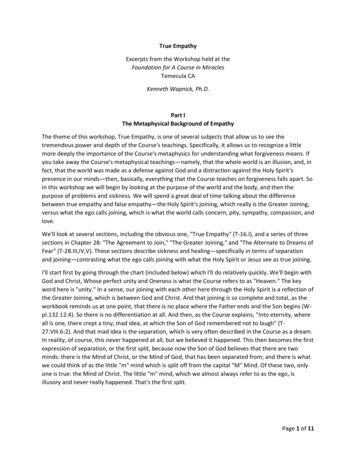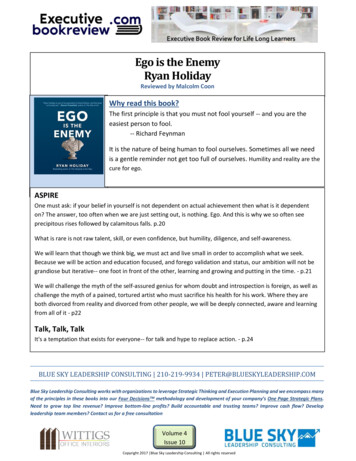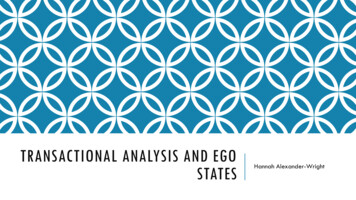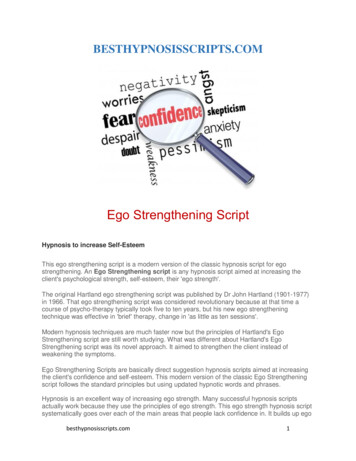
Transcription
LEADERSHIPEgo Is the Enemy of GoodLeadershipby Rasmus Hougaard and Jacqueline CarterNovember 06, 2018FRANCESCO CARTA FOTOGRAFO/GETTY IMAGESOn his first day as CEO of the Carlsberg Group, a global brewery and beveragecompany, Cees ‘t Hart was given a key card by his assistant. The card locked outall the other floors for the elevator so that he could go directly to his corneroffice on the 20th floor. And with its picture windows, his office offered astunning view of Copenhagen. These were the perks of his new position, onesthat spoke to his power and importance within the company.
Cees spent the next two months acclimating to his new responsibilities. Butduring those two months, he noticed that he saw very few people throughoutthe day. Since the elevator didn’t stop at other floors and only a select group ofexecutives worked on the 20th floor, he rarely interacted with other Carlsbergemployees. Cees decided to switch from his corner office on the 20th floor to anempty desk in an open-floor plan on a lower floor.When asked about the changes, Cees explained, “If I don’t meet people, I won’tget to know what they think. And if I don’t have a finger on the pulse of theorganization, I can’t lead effectively.”This story is a good example of how oneFURTHER READINGThe Mind of the Leaderleader actively worked to avoid the riskBook by Harvard Businessof insularity that comes with holdingReviewsenior positions. And this risk is a real 30.00View Detailsproblem for senior leaders. In short, thehigher leaders rise in the ranks, themore they are at risk of getting aninflated ego. And the bigger their egogrows, the more they are at risk of ending up in an insulated bubble, losingtouch with their colleagues, the culture, and ultimately their clients. Let’sanalyze this dynamic step by step.As we rise in the ranks, we acquire more power. And with that, people are morelikely to want to please us by listening more attentively, agreeing more, andlaughing at our jokes. All of these tickle the ego. And when the ego is tickled, itgrows. David Owen, the former British Foreign Secretary and a neurologist, andJonathan Davidson, a professor of psychiatry and behavioral sciences at DukeUniversity, call this the “hubris syndrome,” which they define as a “disorder ofthe possession of power, particularly power which has been associated withoverwhelming success, held for a period of years.”
An unchecked ego can warp our perspective or twist our values. In the words ofJennifer Woo, CEO and chair of The Lane Crawford Joyce Group, Asia’s largestluxury retailer, “Managing our ego’s craving for fortune, fame, and influence isthe prime responsibility of any leader.” When we’re caught in the grip of theego’s craving for more power, we lose control. Ego makes us susceptible tomanipulation; it narrows our field of vision; and it corrupts our behavior, oftencausing us to act against our values.Our ego is like a target we carry with us. And like any target, the bigger it is, themore vulnerable it is to being hit. In this way, an inflated ego makes it easier forothers to take advantage of us. Because our ego craves positive attention, it canmake us susceptible to manipulation. It makes us predictable. When peopleknow this, they can play to our ego. When we’re a victim of our own need to beseen as great, we end up being led into making decisions that may bedetrimental to ourselves, our people, and our organization.An inflated ego also corrupts our behavior. When we believe we’re the solearchitects of our success, we tend to be ruder, more selfish, and more likely tointerrupt others. This is especially true in the face of setbacks and criticism. Inthis way, an inflated ego prevents us from learning from our mistakes andcreates a defensive wall that makes it difficult to appreciate the rich lessons weglean from failure.Finally, an inflated ego narrows our vision. The ego always looks for informationthat confirms what it wants to believe. Basically, a big ego makes us have astrong confirmation bias. Because of this, we lose perspective and end up in aleadership bubble where we only see and hear what we want to. As a result, welose touch with the people we lead, the culture we are a part of, and ultimatelyour clients and stakeholders.
Breaking free of an overly protective or inflated ego and avoiding the leadershipbubble is an important and challenging job. It requires selflessness, reflection,and courage. Here are a few tips that will help you:Consider the perks and privileges you are being offered in your role. Some ofthem enable you to do your job effectively. That’s great. But some of them aresimply perks to promote your status and power and ultimately ego. Considerwhich of your privileges you can let go of. It could be the reserved parking spotor, like in Cees ‘t Hart’s case, a special pass for the elevator.Support, develop, and work with people who won’t feed your ego. Hire smartpeople with the confidence to speak up.Humility and gratitude are cornerstones of selflessness. Make a habit of takinga moment at the end of each day to reflect on all the people that were part ofmaking you successful on that day. This helps you develop a natural sense ofhumility, by seeing how you are not the only cause of your success. And endthe reflection by actively sending a message of gratitude to those people.The inflated ego that comes with success — the bigger salary, the nicer office,the easy laughs — often makes us feel as if we’ve found the eternal answer tobeing a leader. But the reality is, we haven’t. Leadership is about people, andpeople change every day. If we believe we’ve found the universal key to leadingpeople, we’ve just lost it. If we let our ego determine what we see, what we hear,and what we believe, we’ve let our past success damage our future success.Rasmus Hougaard is the founder and managing director of PotentialProject, a global leadership and organizational development firm serving Microsoft,Accenture, Cisco and hundreds of other organizations. He is publishing his secondbook The Mind of the Leader – How to Lead Yourself, Your People and YourOrganization for Extraordinary Results with HBR Press in March 2018.
Jacqueline Carter is a partner and the North American Director of PotentialProject. She is co-author of The Mind of the Leader – How to Lead Yourself, YourPeople and Your Organization for Extraordinary Results (HBR Press, 2018) as wellas co-author with Rasmus Hougaard on their first book One Second Ahead:Enhancing Performance at Work with Mindfulness.This article is about LEADERSHIP Follow This TopicRelated Topics: Leadership TransitionsCommentsLeave a CommentPost Comment26 COMMENTSDaniel Diniz 11 hours agoThis topic is marvelous per se, but while reading the article I felt like the both authors didn’tbelieved what they wrote. They seems more to get through the article wanting to please people thatare egotistical, like “stepping into eggshells” approach.This is something we, Leaders with capital L, all must be not preaching but living everyday. Theegotistical leader, isn’t a leader at all. He/She are actually doing everything to please their ego. Thenew generation doesn’t believe this people. They don’t follow anyone of them. Real Leadership isabout people, empowering them, encouraging them, making everything to help them be successful.And the real Leader will find his/her happiness & fulfillment seeing the Team winning.0 0 Reply POSTING GUIDELINESJoin The Conversation
We hope the conversations that take place on HBR.org will be energetic, constructive, and thought-provoking. Tocomment, readers must sign in or register. And to ensure the quality of the discussion, our moderating team willreview all comments and may edit them for clarity, length, and relevance. Comments that are overly promotional,mean-spirited, or off-topic may be deleted per the moderators' judgment. All postings become the property ofHarvard Business Publishing.
Ego makes us susceptible to manipulation; it narrows our field of vision; and it corrupts our behavior, often causing us to act against our values. Our ego is like a target we carry with us. And like any target, the bigger it is, the more vulnerable it is to being hit. In this way, an inflated ego makes it easier for others to take advantage of us.










